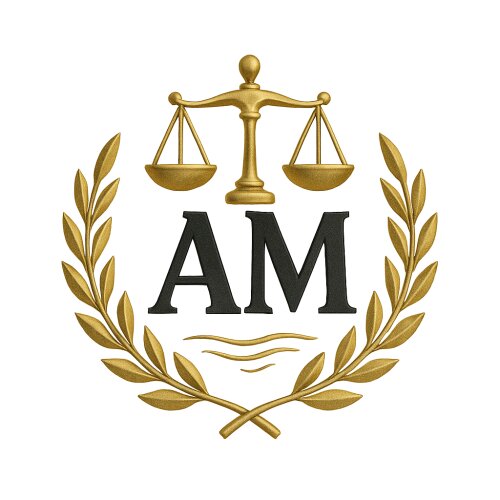Best Commercial Real Estate Lawyers in Mława
Share your needs with us, get contacted by law firms.
Free. Takes 2 min.
Free Guide to Hiring a Real Estate Lawyer
List of the best lawyers in Mława, Poland
About Commercial Real Estate Law in Mława, Poland
Commercial real estate law in Mława combines national Polish regulations with local planning and administrative practice. Transactions and projects are governed by acts such as the Civil Code, the Act on Real Estate Management, the Construction Law, tax regulations and environmental law, while detailed land use and building permissions depend on local plans and decisions issued by municipal and county offices. In Mława you will work with institutions like the Municipal Office of Mława, the Starostwo Powiatowe in Mława and the local district court that maintains land and mortgage registers. Commercial property matters typically involve purchase or sale, leases, development and construction, zoning and planning compliance, environmental assessments and registration of rights in the land and mortgage register.
Why You May Need a Lawyer
Commercial real estate deals can be complex and carry significant financial, regulatory and operational risks. A lawyer can help with due diligence - verifying ownership, encumbrances and land use rights - and can identify legal risks that affect value or use. Lawyers draft and negotiate sale agreements, lease agreements and development contracts and advise on tax consequences, VAT and transaction taxes. They represent clients in permit proceedings, administrative appeals and disputes - for example relating to construction permits, building inspections, easements or nonconforming uses. A lawyer also ensures proper formality for transfers of ownership - including preparation for notarial deeds and registration in land and mortgage registers - and assists with enforcement actions and financing matters such as mortgage creation and foreclosure.
Using a lawyer reduces the chance of unexpected liabilities, delays and failed investments. For cross-border investors or parties unfamiliar with Polish practice, a local lawyer also explains practical steps and local customs.
Local Laws Overview
Key legal areas and local rules relevant in Mława include the following. Zoning and spatial planning - development rights are set primarily by the Miejscowy Plan Zagospodarowania Przestrzennego (local spatial development plan) adopted by the municipal council of Mława. If no local plan exists, building-rights may require a decision on land development conditions - decyzja o warunkach zabudowy - issued by the municipal or county authority.
Construction law - construction permits and building supervision follow the Construction Law. Certain works need a building permit or notification to the building authority, and completed buildings often require a permit to use - pozwolenie na użytkowanie. Inspections and enforcement fall under the Powiatowy Inspektorat Nadzoru Budowlanego and the municipal building administration.
Land and mortgage registers - ownership and encumbrances are recorded in księgi wieczyste maintained by the district court. A lawyer will check these records for mortgages, easements, liens and other entries that affect transaction security.
Notarial form and transfer - real estate transfers in Poland require a notarial deed to be valid. The notary public prepares the deed, confirms identity and signatures, and submits documents for registration.
Taxes and fees - buying a commercial property may trigger tax on civil law transactions (PCC) or VAT depending on the nature of the seller and property, plus notary and court fees and ongoing local property tax payable to the Gmina Mława. Developers and owners should also check potential local fees such as planning fees or contributions required by local planning instruments.
Environmental and heritage rules - some projects require an environmental decision or assessment, and properties in conservation zones or with historic value require consultation with the voivodeship conservator of monuments. Utilities and infrastructure - rights to connect to water, sewage, electricity and gas are governed by contracts with local providers and by administrative conditions set by municipal services.
Frequently Asked Questions
How do I check who owns a commercial property in Mława?
To verify ownership and encumbrances obtain an excerpt from the land and mortgage register - odpis z księgi wieczystej - kept by the district court. Your lawyer can obtain and interpret the register and related documents such as copies of notarial deeds, cadastral records and the land-and-building registry (ewidencja gruntów i budynków).
Do I always need a building permit for construction or renovation?
Not always. Whether you need a building permit, a simplified notification or no administrative approval depends on the scope of works and the local spatial plan or a decision on development conditions. Structural changes, new buildings and some change of use typically require a permit. Consult the municipal building office or a lawyer early to avoid illegal construction and fines.
What is the role of the local spatial development plan in Mława?
The local spatial development plan (MPZP) sets permitted uses, building parameters, development density and infrastructure requirements. If a suitable plan exists for the plot, its rules determine what can be built. If no plan exists, you need a decision on development conditions which is a separate administrative process and may be less predictable.
How are commercial leases regulated in Poland?
Commercial leases are primarily governed by the Civil Code and the contract terms agreed by the parties. Leases can be negotiated freely, but typical areas for legal advice include rent indexing, maintenance obligations, duration and termination, subletting, security deposits and liability for defects. A lawyer will help draft clauses that protect your business interests and ensure compliance with tax and registration requirements.
What taxes apply when buying commercial property?
Taxes depend on whether the seller is a private person or VAT taxpayer and on the type of property. Purchases from private sellers are typically subject to PCC tax (2 percent) unless VAT is applicable. New buildings or sales by VAT-registered entities may be subject to VAT at the applicable rate. Buyers should also budget for notary fees, court registration fees and ongoing property tax payable to the municipality.
Can I rely on verbal promises from a seller or developer?
No. Real estate transactions require formal written documentation to be effective and enforceable. Transfers of ownership require a notarial deed, and important obligations should be included in written contracts. A lawyer will advise which promises need to be recorded and how to enforce rights legally.
What is included in a typical legal due diligence for an acquisition?
Due diligence normally covers title verification in land and mortgage registers, checks for encumbrances and liens, verification of planning and permit status, building and technical documentation, environmental liabilities, pending litigation or enforcement, contractual obligations affecting the property and review of tax history. The scope may be tailored to the transaction and the buyer's risk tolerance.
How do I register a mortgage or security interest on a commercial property?
A mortgage is created by a notarial deed and entered in the land and mortgage register. Lenders often require a legal mortgage as security for loans. Your lawyer or notary will prepare the mortgage deed and ensure the registration process with the court where the land and mortgage register is kept.
What if a public authority wants to expropriate land in Mława for public use?
Expropriation for public purpose follows strict statutory procedures and entitles the owner to fair compensation. Affected owners should consult a lawyer immediately to protect rights, assess compensation, challenge the public purpose or procedure if appropriate, and negotiate settlement terms or represent the owner in administrative and court proceedings.
How long does it take to complete a typical property purchase transaction?
Timelines vary by complexity. A straightforward purchase with clear title and an existing local plan can close in a few weeks once the notarial deed is prepared and taxes and fees are paid. More complex deals - involving development conditions, permits, mortgage funding, or corporate approvals - can take several months. Early legal work on due diligence and documentation shortens delays.
Additional Resources
For help and official information consider contacting these types of institutions in or near Mława. The Municipal Office of Mława - for local spatial planning information, property tax, local permits and municipal records. Starostwo Powiatowe in Mława - for county-level administration, building supervision contacts and infrastructure issues. District Court in Mława - for land and mortgage register information and civil litigation. Powiatowy Inspektorat Nadzoru Budowlanego - for construction supervision and compliance. Mazowieckie Voivodeship offices and the voivodeship conservator of monuments - for heritage and regional environmental matters if relevant. Professional advisors - local notaries, licensed surveyors (geodeta), certified accountants and local real estate lawyers - help with transactional, technical and tax aspects. National professional bodies - such as the local bar associations and Polish Chamber of Notaries - can help you find certified professionals.
Next Steps
1. Gather core documents - obtain the land and mortgage register excerpt, recent map extract, copies of any planning documents, technical building documentation and seller identification records. Your lawyer will tell you which documents are essential for your case.
2. Arrange an initial legal consultation - discuss goals, timeline, legal risks and fee structure. A local Mława lawyer can explain municipal specifics and identify immediate red flags.
3. Commission due diligence - have a lawyer check title, encumbrances, planning status, permits and environmental liabilities. If needed, instruct surveyors or technical experts.
4. Negotiate and draft contracts - use legal counsel to prepare sale agreements, leases or development contracts with clear conditions, warranties and timelines. Include escrow arrangements and detailed closing procedures.
5. Complete formalities - sign the notarial deed, pay applicable taxes and fees, and register changes in the land and mortgage register. Follow up on permit applications, utilities connections and handover procedures.
6. Post-closing compliance - ensure property tax registration, review insurance, update lease rolls and implement any required remedial or compliance work identified during due diligence. Keep your lawyer involved for enforcement or dispute resolution if problems arise.
If you are unfamiliar with Polish procedures or Mława practice, prioritize hiring a local lawyer experienced in commercial real estate transactions. Early legal advice helps avoid costly mistakes and speeds up successful project delivery.
Lawzana helps you find the best lawyers and law firms in Mława through a curated and pre-screened list of qualified legal professionals. Our platform offers rankings and detailed profiles of attorneys and law firms, allowing you to compare based on practice areas, including Commercial Real Estate, experience, and client feedback.
Each profile includes a description of the firm's areas of practice, client reviews, team members and partners, year of establishment, spoken languages, office locations, contact information, social media presence, and any published articles or resources. Most firms on our platform speak English and are experienced in both local and international legal matters.
Get a quote from top-rated law firms in Mława, Poland — quickly, securely, and without unnecessary hassle.
Disclaimer:
The information provided on this page is for general informational purposes only and does not constitute legal advice. While we strive to ensure the accuracy and relevance of the content, legal information may change over time, and interpretations of the law can vary. You should always consult with a qualified legal professional for advice specific to your situation.
We disclaim all liability for actions taken or not taken based on the content of this page. If you believe any information is incorrect or outdated, please contact us, and we will review and update it where appropriate.










